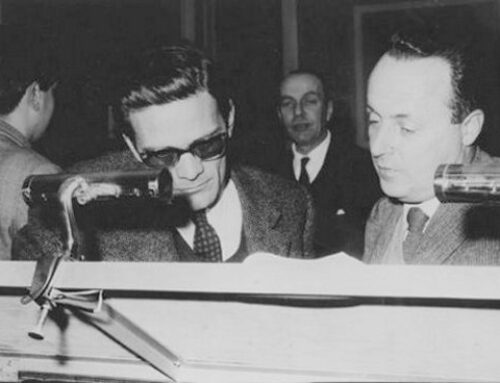How to Become a Voice Actor
How does one become a voice actor? Summarizing the fundamental points from the previous articles, let’s highlight that:
- Dubbing should be approached from a young age, aiming to develop acting skills and reflexes similar to those of the actors being dubbed.
- Acting training should cover all aspects: perfect diction, a good reading pace, interpretive immersion, strong cultural foundation, expressive versatility, sense of sacrifice and duty, patience, humility, eagerness to learn, adaptability, and determination.
- Attending quality acting courses (starting with school theater is always helpful) and pursuing further education in a renowned drama academy is essential.
- Observing professionals during dubbing sessions, getting noticed by directors, and living in a dubbing city, preferably Rome, which hosts top-notch professionals in the field, are crucial steps.
- For late-blooming talent, after formative years in theaters, a solid course in diction and dubbing is necessary for entry.
- Registering with an agency and participating in various casting calls related to entertainment, accumulating experiences to build a curriculum.
- Accepting minor dubbing roles initially, even background noise. Paying your dues is integral to this career. For those outside the industry, paying dues is not a magical initiation but rather a necessary experience to showcase your skills and reliability, which are typically ensured in the family’s professionally accredited and trustworthy acting environment. Furthermore, a child with acting lineage is already accustomed to dubbing studios and colleagues, making them more adaptable and quicker than an outsider who faces the fears of an unfamiliar environment and the shyness towards those observing them. A child from an acting family is, therefore, more mature artistically (having contributed fifteen years towards maturity) and humanely (learning seriousness and professionalism from a young age through direct interaction with veteran colleagues). They mature more in society, thanks to the knowledge gained from narrating documentaries and films on various global topics (at eighteen, they have a much higher maturity than non-dubbing peers, which compensates for challenging schoolwork due to studio work). Another important detail: it’s not possible to put just any child on the street or in schools to dub, especially if they lack diction, basic cultural knowledge, or parental approval for minor work. It’s also important to consider the child’s willingness, given that they might be required to fulfill a role on the same day. Such research is not within our purview; there’s no casual talent search (evidently it doesn’t work this way), nor can anyone take leave from their dubbing job to improvise. It’s not uncommon for a child from an acting background to be preferred over an external talent.
- Once in the field, prioritize studio work with seriousness, professionalism, and a sense of responsibility, knowing that neglecting these aspects can lead to exclusion from further dubbing opportunities. For a skilled talent, a career in dubbing is a matter of time. A professional voice actor, as mentioned before, is expected to match the vocal, emotional, and technical performances of global cinema stars as closely as possible. This profession cannot be taken up professionally without prior training, especially without significant acting experiences.
Carving a niche in dubbing is inherently challenging, and a more spontaneous approach often lags behind those who have been acting since childhood. Starting at twenty years old cannot compete with a professional peer who started at four, especially without theatrical or foundational stage roles. Starting late means immediately competing with experienced actors who have been on set and stage for fifteen to twenty years, while a novice dubber is fresh out of three years in an academy or slightly more. In childhood, growing alongside the actors you dub, staying updated, and incorporating the necessary qualities to provide the best performance Hollywood demands is key.
That’s why it’s important to reflect on whether desire and capability truly align. Starting late often leads to lesser roles, and rarely do they get many dubbing sessions or important opportunities as one would hope. In this scenario, limited studio time results in inadequate training and significant hindrances in advancing to more challenging and, consequently, more remunerative roles. It’s a complex and scarcely manageable situation, with natural dynamics that lead to direct consequences. Of course, one can still attempt it, but most of the time, it makes little sense – a waste of money, time, and overly zealous hopes.
Serious, professional, and consistent studying and practice are necessary. Even if you’re excellent on set and on stage, dubbing proficiency may not immediately follow. Dubbing technique differs; adapting to the microphone has its own unique characteristics. Not all actors who don’t dub can dub well; even they, as professionals, rarely excel. For late starters, it’s a challenging and risky endeavor. Being inflexible is useless. When necessary, it’s important to realize with dignified resignation that this is not a job for everyone. So be careful when asking, ‘Can I dub too?’ without already being a very skilled actor. It’s like asking, ‘Can I compete in the Olympics without training first?’ Answer: ‘Technically, you can, your physique won’t stop you. But don’t complain if you have a heart attack within a minute or miraculously arrive last at the finish line.’
Another factor not to be underestimated: an external talent often cares less about the work environment than someone who grew up within it. They will be absent from union assemblies, accept poorly executed and lower-paying jobs more often than true professionals, and have less loyalty to colleagues.
Historical memory always makes a difference, in every field, just as emotions do. A dubber with family ties to the industry is more active in preserving its artistic quality, more engaged in union battles, more loyal to colleagues, and more motivated overall. An external talent, due to their preconceived notions about the job, often sees colleagues as competitors to beat at every opportunity, lacking deeper human interests that have beneficial effects on the industry.
A dubber who grew up with colleagues is more frequently loyal and serious. The family component often plays an important role, conceptually overlooked or undervalued.
In Italy, this issue has plagued cinema and TV for years, and to some extent, theater as well. Opening the doors to too many external ‘talents,’ primarily driven by profit, commerce, and personal vanity, has led to a decline in artistic standards compared to their glorious past.
Dubbing has managed to preserve its integrity largely due to its anonymity. Now that it’s becoming famous, let’s be cautious not to repeat history. This doesn’t preclude external talents, but rather untrained ones. Dubbing studios handle sound for major productions in collaboration with Hollywood and its directors. As a result, they cannot wait for a twenty-five-year-old rookie to develop their skills until they’re truly ready. In entertainment, time is more valuable than ever, and in high-level cinema, basic lessons cannot be given to inexperienced beginners who want to dub protagonists immediately or almost immediately. Mediocre dubbing of minor characters is not enough, as nuances should still match the same quality standards as those of the main characters. Even for a minor role, an established voice actor is often chosen, at least for major titles.
Cultivating dreams is good, but they must be within reach of one’s capabilities and possibilities. Here’s a cartoon that summarizes the concept, a dialogue between a dentist and a dubbing
patient (based on a true story): Dentist: “They say I have a nice voice. Can you take me to the recording studio with you? Maybe I can do dubbing too.” Patient: “Sure, of course. What are you doing tomorrow?” Dentist: “Well, I can’t tomorrow. I have to do some fillings.” Patient: “I’ll do it! You dub in my place, and I’ll perform dental work in yours.” Dentist: “No, no! How can you operate if you’re not skilled? These things require years of training and practice.” Patient: “And how can you dub if you’re not skilled? These things require years of training and practice.”
For those who venture into the entertainment world later in life, other acting avenues like theater, cinema, and TV can still be pursued. Dubbing is the most challenging technique, but it’s not a reason to be discouraged. Perhaps you won’t become a voice actor, but you can become a colleague on set and stage instead.
If you possess an engaging voice without acting skills, then radio hosting could be a path worth exploring
If you possess an engaging voice without acting skills, then radio hosting could be a path worth exploring. Radio hosts use their voices to captivate and entertain listeners, providing valuable information and creating a connection with their audience. This avenue allows you to leverage your voice’s natural qualities and charm to engage listeners and convey messages effectively.
In conclusion, becoming a voice actor requires dedication, training, and a genuine passion for the craft. Starting at a young age, honing your acting skills, attending acting courses, and gaining experience through auditions and small roles are crucial steps. A solid foundation in the industry, along with a supportive network of fellow professionals, can contribute to your success as a voice actor.
Whether you’re embarking on this journey early in life or exploring it as a second career, remember that the world of voice acting demands commitment and perseverance. While it may not be an easy path, the rewards of lending your voice to various characters and narratives can be incredibly fulfilling. So, if you have the drive and determination to become a skilled and versatile voice actor, don’t hesitate to pursue your dream and immerse yourself in the captivating world of dubbing.























